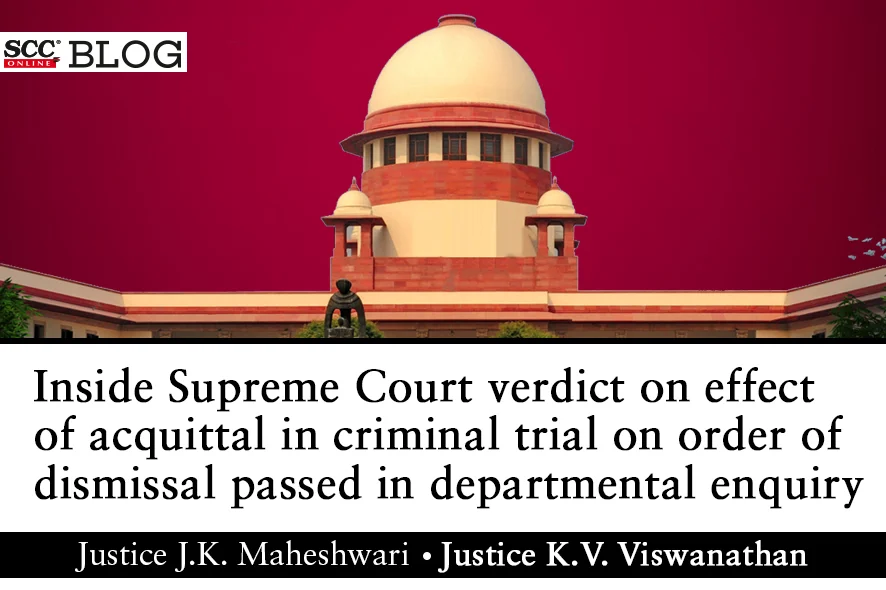Supreme Court: In a matter concerning the validity of disciplinary proceedings when it is based on same evidence, witnesses, and circumstances in a criminal case that ended up in acquittal, the division bench of J.K. Maheshwari and K.V. Viswanathan*, JJ. has declared that the order of termination dated 31-03-2004; the order of the Appellate Authority dated 08-10-2004; the orders refusing to reconsider and review the penalty, are all illegal and untenable. Further. It directed for reinstatement of the constable with all consequential benefits including seniority, notional promotions, fitment of salary and all other benefits. It also awarded 50 percent of the backwages to the Constable.
Background:
A First Information Report (‘FIR’) was registered on 02-09-2022 against a constable of Rajasthan Armed Constabulary, under Sections 420, 467, 468 and 471 of the Penal Code, 1860 (‘IPC’) Thereafter, a chargesheet in a departmental enquiry was also issued. It was alleged that the convict altered his date of birth from 21-04-1974 to 2-04-1972 in his 8th standard marksheet. It was alleged that this was done to project himself as having attained majority at the time of the recruitment.
The Enquiry Officer in the departmental proceeding found the charges proved and the Disciplinary Authority, by an order of 31-03-2004, dismissed the constable from the service. The Appellate Authority also dismissed the appeal. At the criminal trial, the Trial Court convicted the constable for the offence under Section 420 IPC and sentenced him to undergo three years’ imprisonment along with a fine of Rs.5,000/-. However, the Additional District and Sessions Judge, Jodhpur (‘Appellate Judge’), vide judgment dated 24-08-2007, allowed the criminal appeal and acquitted the constable.
Thus, the constable represented for his reinstatement. Subsequently, he filed a writ petition for quashing the dismissal order, the order of the Appellate Authority, and the orders refusing to review and reconsider the above-said orders.
The Single Judge, by the impugned judgment dismissed the writ petition by holding that the standard of proof in a criminal proceeding and departmental proceeding is different. The Single Judge found no infirmity in the order of the Disciplinary Authority. The writ appeal filed by the constable has also been dismissed by elucidating as to how the parameters for a judicial review against an order in a departmental proceeding are limited and circumscribed. Being aggrieved, the constable filed the present appeal.
Issues:
-
Whether the dismissal of the constable from service pursuant to the departmental enquiry was justified?
-
On the facts of the case, what is the effect of the acquittal, ordered by the Appellate Judge in the criminal trial, on the order of dismissal passed in the departmental enquiry?
Analysis:
Reiterating that a Writ Court’s power to review the order of the Disciplinary Authority is very limited, the Court said that the scope of enquiry is only to examine whether the decision-making process was legitimate.
The Court took note of Inspector General of Police v. S. Samuthiram, (2013) 1 SCC 598, wherein it was held that mere acquittal by a Criminal Court will not confer on the employee a right to claim any benefit, including reinstatement. Further, it took note of G.M. Tank v. State of Gujarat, (2006) 5 SCC 446, and said that if the charges in the departmental enquiry and the criminal court are identical or similar, and if the evidence, witnesses and circumstances are one and the same, then the matter acquires a different dimension.
Concerning the issue of the validity of the disciplinary proceedings, the Court, after noting the evidence, said that no alteration was found in the constable’s 8th class marksheet and the date of birth mentioned on it was 21-04-1972.
The Court said that the relevant and material evidence being, the deposition of witness 5; the marksheet of 8th class and the original marksheet have been completely left out in the discussion and consideration., even though these materials have a direct bearing on the charge.
The Couret reiterated that if the findings of the disciplinary authorities are arrived at after ignoring the relevant material, the Court in judicial review can interfere. Further, it held that the disciplinary proceedings are vitiated and deserve to be quashed.
Further, the Court accepted the explanation given by the constable that overwriting in the application form was only due to correction of an inadvertent error. Thus, as long as the original 8th standard marksheet reflected his date of birth as 21-04-1972 and there is no correction or manipulation in that document, the constable cannot be penalised.
Considering the effect of acquittal in the criminal proceeding, the Court noted that the Appellate Judge has clearly recorded that in the original marksheet of the 8th standard, the date of birth was clearly shown as 21-04-1972 and the other documents produced by the prosecution were either letters or a duplicate marksheet. Further, after reading the entire judgment, the Court said that it indicates that the constable was acquitted after full consideration of the prosecution evidence and after noticing that the prosecution has miserably failed to prove the charge.
After taking note of Vijayee Singh v. State of U.P., (1990) 3 SCC 190, wherein it was held that a fact is said to be “not proved” when it is neither “proved” nor “disproved” , the Court said that the findings of the Appellate Judge in the criminal case clearly indicate that the charge against the constable was not just, “not proved”, in fact the charge even stood “disproved” by the very prosecution evidence.
Thus, the Court, while setting aside the orders passed by the disciplinary authority and the appellate authority, said that allowing them to stand will be unjust, unfair and oppressive, as the charges were not just similar but identical and the evidence, witnesses and circumstances were all the same.
[Ram Lal v. State of Rajasthan, 2023 SCC OnLine SC 1618, decided on 04-12-2023]
*Judgment Authored by: Justice K.V. Viswanathan
Know Thy Newly Appointed Supreme Court Judge: Justice K.V. Viswanathan







